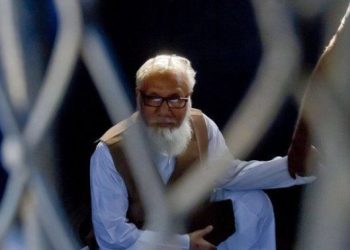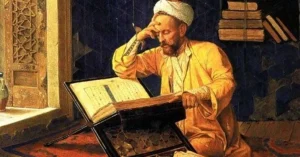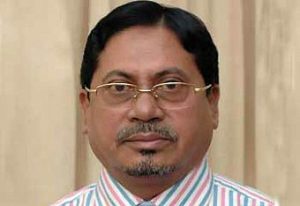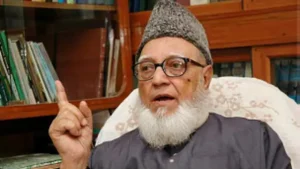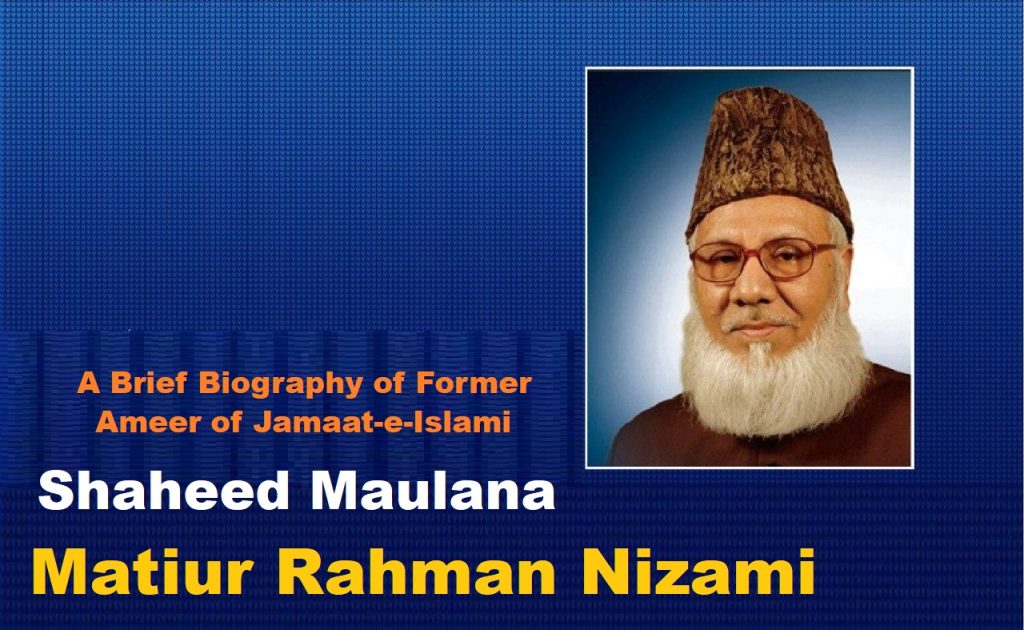
Shaheed Maulana Matiur Rahman Nizami
Leadership in National Politics
He played a pivotal role in every major democratic movement in post-independence Bangladesh. From opposing the 1982–90 military regime to actively leading the 1990 mass uprising, his leadership stirred nationwide support. After the 1991 elections, held under the caretaker system proposed by Jamaat, he tabled a parliamentary motion that eventually institutionalized the caretaker system in the Constitution.
Between 1996 and 2001, he united Islamic and nationalist forces against Awami League’s authoritarianism. He led campaigns against madrasa closures, human rights violations, and controversial treaties, giving people renewed hope and direction.
During the 2007 illegal caretaker government, he strongly protested against election cancellation, emergency rule, and political repression. He also spearheaded movements addressing issues such as the Farakka and Tipaimukh dams.
Leader of the Four-Party Alliance
By late 1999, Maulana Nizami emerged as a central leader of the Four-Party Alliance, which won the 2001 elections with a two-thirds majority. He played a strategic role in maintaining the alliance’s unity and countering conspiracies against it.
Parliamentary Contributions
In Parliament, he consistently delivered well-reasoned, evidence-backed speeches on key national and international issues. As the parliamentary party leader, he served on several vital committees. His balanced, intelligent approach left a lasting mark on Bangladesh’s parliamentary history.
Contributions to Nation Building and Development
As Minister for Agriculture and Industries (2001–2006), Maulana Nizami introduced reforms with transparency and efficiency. His “Farmer’s House, Garden House” initiative evolved into today’s “One House One Farm” project. Under his leadership, Bangladesh achieved a 10.45% industrial growth rate, revived idle factories, ensured fertilizer supply, and launched the Savar Leather Industrial Town. He also turned a Tk 700 million profit in the sugar industry.
Internationally, he led Bangladesh’s delegation to the World Food Conference in Rome and the World Rice Research Organization in Thailand. He established the National Accreditation Board to combat counterfeits and enabled global certification for Bangladeshi products and services. Additionally, he oversaw remarkable development in his home region of Sathia‑Ber.
Firm Stance Against Extremism
When extremists attempted to discredit the government through bombings, Maulana Nizami and Jamaat‑e‑Islami openly condemned their actions. His firm response led to the arrest and prosecution of top JMB (Jama’atul Mujahideen Bangladesh) leaders during his tenure.
Promotion of Madrasa Education
Maulana Nizami worked tirelessly to reform madrasa education. Under the Four-Party Alliance, his efforts led to official recognition of Qawmi madrasas, along with significant improvements in Fazil and Kamil courses—a direct result of his vision and advocacy.
International Engagements
He stood firmly for global Muslim issues such as the Babri Masjid demolition, Bosnian genocide, and Israeli aggression in Palestine and Lebanon. In Parliament, he led the passage of a unanimous resolution condemning insults to Prophet Muhammad by a German professor and the Danish cartoons—a historical precedent.
In 2002, he met scholars like Dr. Yusuf al-Qaradawi and attended Rābita Al‑Alam Al‑Islāmī conferences regularly. He served as a permanent member of its Central Coordinating Committee. In 2003, he presided over an international conference in China on iodine deficiency. In 2006, Chatham House UK invited him—the first Bangladeshi leader to present on “Islamic Political Parties in Bangladesh’s Democratic Process”.
Recognition and Hajj Pilgrimage
In 2009, the Royal Islamic Strategic Studies Centre listed him among the top 50 global Muslim personalities. He also performed multiple Hajj pilgrimages as a royal guest of the Saudi king.
Author and Thinker
Despite his demanding responsibilities, Maulana Nizami made significant contributions to Islamic literature and research. He had a passion for writing, regularly contributed to newspapers and journals, and authored 61 books known for their originality, scholarly depth, and practical relevance.
Maulana Motiur Rahman Nizami: A Victim of Judicial Killing by the Fascist Awami League Government
The execution of Maulana Nizami remains one of the darkest episodes in Bangladesh’s political history. As a veteran politician, Islamic scholar, minister, and Jamaat-e-Islami Ameer, he stood as a symbol of integrity and leadership. However, his politically motivated trial and execution triggered global outrage. Human rights groups, legal experts, and international observers widely denounced it as “judicial killing.
